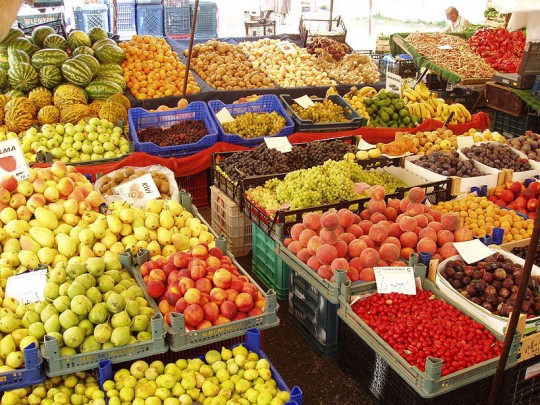Global food prices drop to 11-month low in October, UN agency reports
Global food prices drop to 11-month low in October, UN agency reports
3 November 2011
FAO’s Food Price Index averaged 216 points last month, down 4 per cent from September, the agency said in a news release. The index is a measure of basic food prices at the global level.
“The drop was triggered by sharp declines in international prices of cereals, oils, sugar and dairy products,” said FAO. “Meat prices declined the least.”
The agency attributes the decline to an improved supply outlook for a number of commodities and uncertainty about global economic prospects.
Most agricultural commodity prices could remain below their recent highs in the months ahead, according to FAO’s biannual Food Outlook report, which analyzes developments in global food and feed markets and was also published today.
A record harvest is expected this year for cereals, states the Outlook, which forecasts a record 2,325 million tonnes – 3.7 per cent above last year. Cereal prices are expected to stay relatively firm well into 2012.
FAO said that global cereal prices have declined in recent months, with the Cereal Price Index registering an 11-month-low of 232 points in October. Prices, on average, however remain 5 per cent higher than last year’s already high level.
The agency added that recent floods and their impact on Thailand’s rice production has had limited consequences on the global market thanks to large reserves.
Also, large global supplies of sugar have put downward pressure on sugar prices since June. Improved supplies also weighed on dairy markets while strong palm oil output and record sunflower seed crops have driven prices down in the oils sector in recent months.
The Outlook notes that prices generally remain “extremely volatile,” moving in tandem with unstable financial and equity markets. “Fluctuations in exchange rates and uncertainties in energy markets are also contributing to sharp price swings in agricultural markets,” said FAO Grains Analyst Abdolreza Abbassian.
High food prices, according to the Outlook, are putting pressure on the world’s poorest nations, with the food import bills of the least developed countries (LDCs) soaring by almost a third from last year. The global cost of national food imports is expected to approach $1.3 trillion this year.
The new issue of the Outlook also includes a chapter on the new Agricultural Market Information System (AMIS), established by the Group of 20 leading economies (G-20) earlier this year and housed at FAO headquarters in Rome.
AMIS, managed by a joint Secretariat composed of nine international organizations, has the capacity to collect, analyse and disseminate information on a regular basis regarding the current and future food market situation and food policies.
###
> UN Food and Agriculture Organization (FAO).
The Food and Agriculture Organization of the United Nations (FAO) is an intergovernmental organization and has 191 Member Nations, two associate members and one member organization, the European Union. Achieving food security for all is at the heart of FAO’s efforts – to make sure people have regular access to enough high-quality food to lead active, healthy lives.

FAO’s mandate is to raise levels of nutrition, improve agricultural productivity, better the lives of rural populations and contribute to the growth of the world economy.
The Food and Agriculture Organization of the United Nations (FAO) is working with its Members and the entire international community for achievement of the Millennium Development Goals.
These eight goals – each with specific targets and indicators – are based on the United Nations Millennium Declaration, signed by world leaders in September 2000. They commit the international community to combating poverty, hunger, disease, illiteracy, environmental degradation, and discrimination against women.
![]()
The eight Millennium Development Goals are:
Goal 1: Eradicate extreme poverty and hunger
Goal 2: Achieve universal primary education
Goal 3: Promote gender equality and empower women
Goal 4: Reduce child mortality
Goal 5: Improve maternal health
Goal 6: Combat HIV/AIDS, malaria and other diseases
Goal 7: Ensure environmental sustainability
Goal 8: Develop a Global Partnership for Development
* More information at UN Food and Agriculture Organization (FAO)
###
> United Nations (UN).
 The United Nations was established on 24 October 1945 by 51 countries committed to preserving peace through international cooperation and collective security. Today, nearly every nation in the world belongs to the UN: membership totals 192 countries.
The United Nations was established on 24 October 1945 by 51 countries committed to preserving peace through international cooperation and collective security. Today, nearly every nation in the world belongs to the UN: membership totals 192 countries.
When States become Members of the United Nations, they agree to accept the obligations of the UN Charter, an international treaty that sets out basic principles of international relations. According to the Charter, the UN has four purposes:
- to maintain international peace and security;
- to develop friendly relations among nations;
- to cooperate in solving international problems and in promoting respect for human rights;
- and to be a centre for harmonizing the actions of nations.
###
* The above story is adapted from materials provided by United Nations (UN)
** More information at United Nations (UN)





















